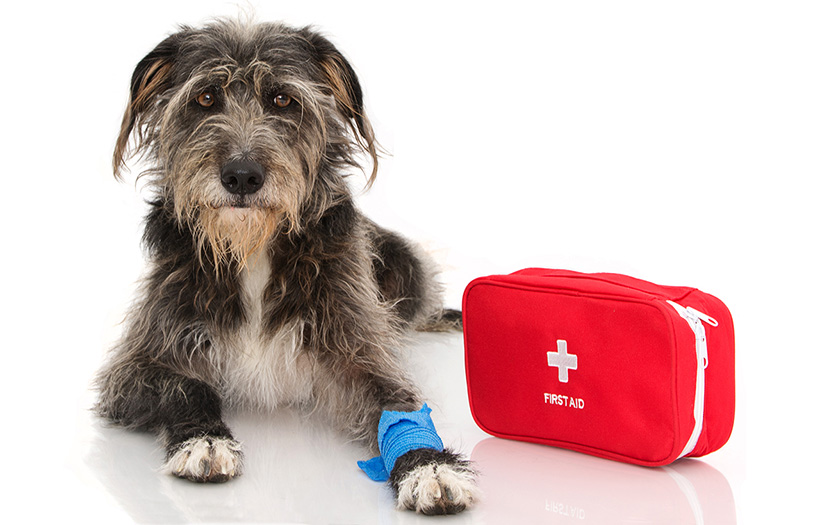Pet First Aid Kit

It’s always important to have a first aid kit available while traveling with your pet. This is also a great item to have around the house in case of an accident. A standard pet first aid kit can be purchased online, but if you wish to make your own, here is a list of items to include, courtesy of The Humane Society of the United States.
Pet-specific supplies:
- Pet first-aid book
- Phone numbers: your veterinarian, the nearest emergency-veterinary clinic (along with directions!) and a poison-control center or hotline (such as the ASPCA poison-control center, which can be reached at 1-800-426-4435)
- Paperwork for your pet (in a waterproof container or bag): proof of rabies-vaccination status, copies of other important medical records and a current photo of your pet (in case he gets lost)
- Nylon leash
- Self-cling bandage (bandage that stretches and sticks to itself but not to fur—available at pet stores and from pet-supply catalogs)
- Muzzle or strips of cloth to prevent biting (don't use this if your pet is vomiting, choking, coughing or otherwise having difficulty breathing)
Basic first-aid supplies:
- Absorbent gauze pads
- Adhesive tape
- Antiseptic wipes, lotion, powder or spray
- Blanket (a foil emergency blanket)
- Cotton balls or swabs
- Gauze rolls
- Hydrogen peroxide (to induce vomiting—do this only when directed by a veterinarian or a poison control expert)
- Ice pack
- Non-latex disposable gloves
- Petroleum jelly (to lubricate the thermometer)
- Rectal thermometer (your pet's temperature should not rise above 103°F or fall below 100°F)
- Scissors (with blunt ends)
- Sterile non-stick gauze pads for bandages
- Sterile saline solution (sold at pharmacies)
- Tweezers
- A pillowcase to confine your cat for treatment
- A pet carrier
Other useful items:
- Diphenhydramine (Benadryl®), if approved by a veterinarian for allergic reactions. A veterinarian must tell you the correct dosage for your pet's size.
- Ear-cleaning solution
- Expired credit card or sample credit card (from direct-mail credit-card offers) to scrape away insect stingers
- Glucose paste or corn syrup (for diabetic dogs or those with low blood sugar)
- Nail clippers
- Non-prescription antibiotic ointment
- Penlight or flashlight
- Plastic eyedropper or syringe
- Rubbing alcohol (isopropyl) to clean the thermometer
- Splints and tongue depressors
- Styptic powder or pencil (sold at veterinary hospitals, pet-supply stores, and your local pharmacy)
- Temporary identification tag (to put your local contact information on your pet's collar when you travel)
- Towels
- Needle-nosed pliers
Remember, a first aid kit is for temporary care until you can get to a veterinary hospital. It should not be considered as a substitute for proper veterinary care.
